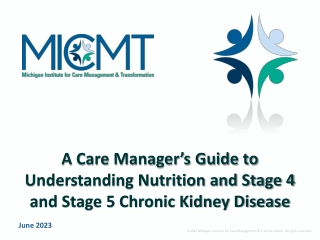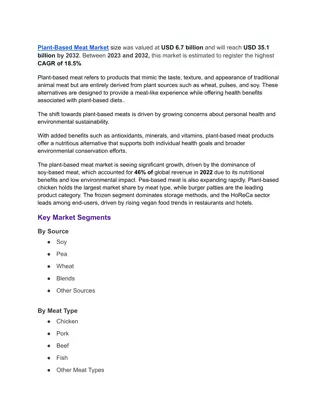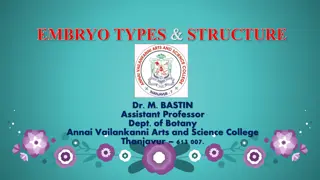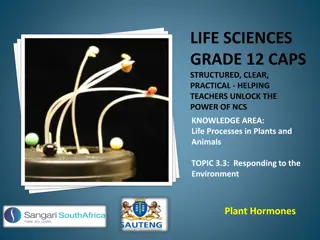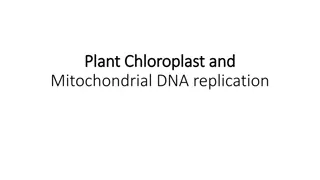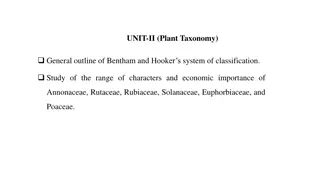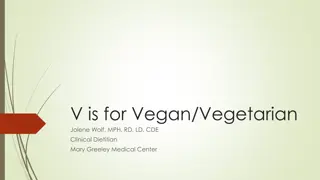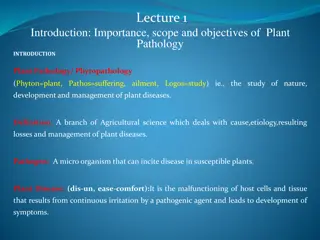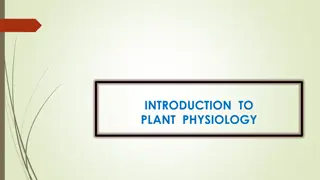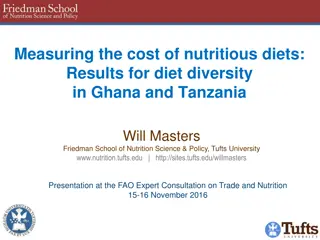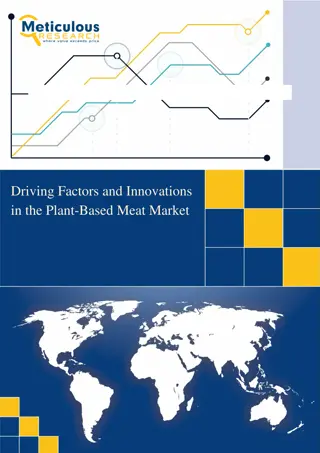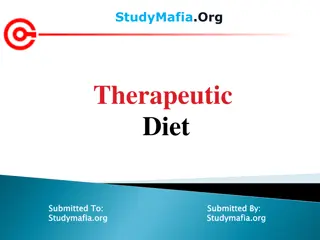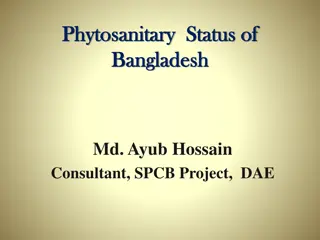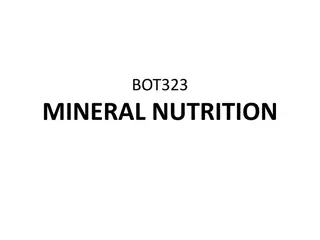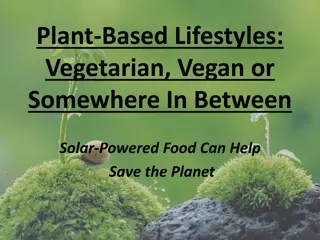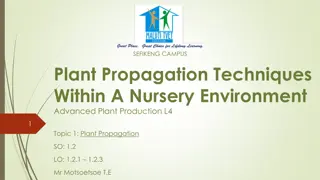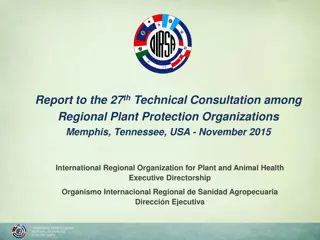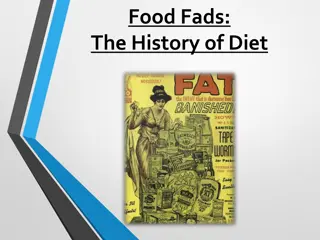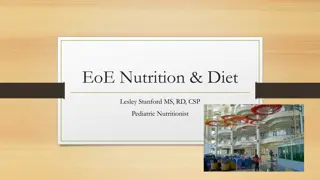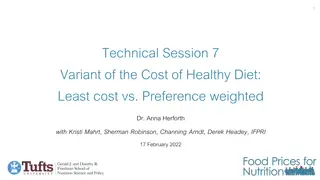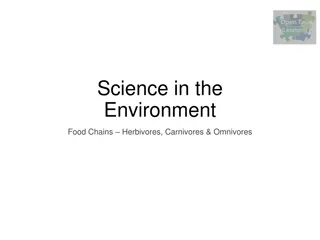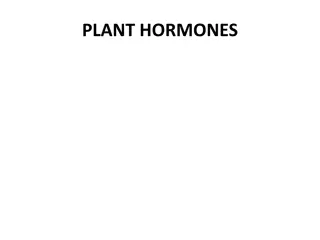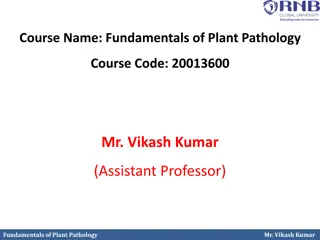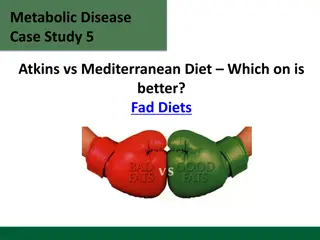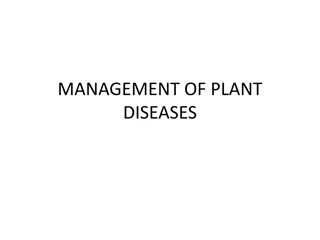Understanding Nutrition for Stage 4 and Stage 5 Chronic Kidney Disease
A comprehensive guide for care managers to understand the importance of nutrition in managing kidney disease and its impact on patients with diabetes, cardiovascular disease, and hypertension. Covers current recommendations, individualized diets based on lab values, and the evolution of kidney diets
3 views • 36 slides
Unit 1: Introduction and History of plant pathology
The science of plant pathology, which studies plant diseases and aims to protect the food supply by improving plant survival in unfavorable conditions. Explore the causes of plant diseases, their symptoms, and methods of prevention and control.
5 views • 13 slides
Amway Nutrilite All Plant Protein Powder 1kg Deutsche Post AG
Amway Nutrilite All Plant Protein Powder is a premium source of protein derived from plant-based ingredients. With each serving, you get a blend of high-quality protein to support your active lifestyle and dietary needs.\nAmway Nutrilite All Plant Protein Powder offers a convenient way to supplement
1 views • 4 slides
Plant-Based Meat Market Strengthens with Rising Flexitarian Diets
Plant-Based Meat Market by Source (Soy, Pea, Wheat, Blends, And Other Sources), By Meat Type (Chicken, Pork, Beef, Fish, and Other Meat Types), By Product Type (Burgers, Patties, Sausages, Other Product Types), By End-User, By Region and Companies -
2 views • 4 slides
Understanding Plant Embryogenesis: A Comprehensive Overview
Plant embryogenesis is a crucial process in the development of plant embryos from fertilized ovules, involving cell division, differentiation, and morphogenesis. This process leads to the formation of seeds, which play a vital role in the plant life cycle. The stages of embryo formation, structure,
0 views • 25 slides
Understanding Plant Tissue Culture: Methods and Requirements
Plant tissue culture involves the in-vitro culture of plant explants under aseptic conditions, covering cell, organ, and suspension cultures. This process, pioneered by German botanist Gottlieb Haberlandt, relies on the totipotency of plant cells. Key requirements include laboratory organization, su
0 views • 18 slides
Understanding Plant Hormones and Their Functions in Plants
Plant hormones play crucial roles in various plant processes such as growth, development, and response to environmental stimuli. Auxins, gibberellins, and abscisic acid are key plant hormones that regulate tropisms, cell division, elongation, flowering, seed germination, and dormancy. Understanding
1 views • 50 slides
Plant Mitochondrial and Chloroplast DNA Replication Mechanisms
Plant mitochondria and chloroplasts have intricate DNA replication processes. Mitochondrial DNA replication is independent of the plant cell cycle and is associated with specific proteins in nucleoid complexes. Plant mtDNA contains more genes than animal mtDNA, with a complex structure involving int
1 views • 16 slides
Overview of Bentham and Hooker's Classification System in Plant Taxonomy
Bentham and Hooker's system of classification in plant taxonomy, outlined in Genera Plantarum, provided detailed descriptions of families and genera based on original plant dissections. This classification system has practical value for plant identification, with keys for taxa and subdivisions for l
2 views • 47 slides
Understanding Plant Tissue Culture Media and Their Importance in In Vitro Growth
Plant tissue culture media play a crucial role in the in vitro growth and morphogenesis of plant tissues. The composition of culture media depends on the specific plant species and the type of material used for culture. Various types of media, such as White's medium, MS medium, B5 medium, N6 medium,
0 views • 6 slides
Understanding Vegetarian Diets: Benefits and Varieties
Discover the different types of vegetarian diets, health benefits, reasons to choose a vegetarian lifestyle, and insights into weight loss considerations. Learn how plant-based diets can improve heart health, lower diabetes risk, and explore the importance of making healthy food choices within a veg
0 views • 43 slides
Understanding Plant Pathology: Importance, Scope, and Objectives
Plant pathology, also known as phytopathology, is the study of plant diseases and their management. It covers the causes, symptoms, and impact of pathogenic organisms on plants. The field aims to understand the interactions between plants and pathogens, develop control methods, and reduce losses in
0 views • 6 slides
Introduction to Plant Physiology: Exploring the Functioning of Plants
Plant physiology is a crucial subdiscipline of botany that delves into the processes and functions operating within plants. This field closely examines areas like plant morphology, ecology, cell biology, and genetics, shedding light on vital processes such as photosynthesis, respiration, and more. T
1 views • 7 slides
European Standards for Plant Biostimulants Development
The European Committee for Standardization (CEN) plays a crucial role in developing European standards for plant biostimulants, focusing on improving plant nutrition processes independently of nutrient content. The CEN/TC.455 committee is responsible for creating standards supporting the EU Fertilis
2 views • 5 slides
Measuring the Cost of Nutritious Diets in Africa: Insights from Ghana and Tanzania
Results of a study on measuring the cost of nutritious diets in Ghana and Tanzania have been presented by Will Masters from Tufts University. The study, funded by UKAid, explores the affordability of nutritious diets in Africa and the trends in food prices. Various food price indexes and indicators
4 views • 24 slides
Plant based meat market 4
The changing lifestyles and an increasing number of health-conscious consumers are increasing the popularity of plant-based meat products, positively impacting the demand for plant-based meat. The growth of the plant-based meat market is mainly attri
1 views • 4 slides
Understanding Plant Tissue Culture: Techniques and Applications
Plant tissue culture involves maintaining and growing plant cells, tissues, or organs in artificial mediums under controlled conditions. It allows the regeneration of whole plants from small plant parts or cells. Hormones like auxins, cytokinins, and gibberellins are used in the process. Proper envi
3 views • 5 slides
Guide to Planning Balanced Diets for All Age Groups
Learn about the importance of balanced diets, nutritional needs for different age groups, and how to plan balanced menus using the food pyramid. Discover tips for weaning babies onto solid foods, including the introduction of iron-rich cereals and vitamin C sources. Ensure babies' diets are free fro
0 views • 39 slides
Understanding Special Diets and Managing Obesity
Explore the impact of nutrients on our bodies, causes of special diets, health issues linked to certain diets like obesity and vegetarianism, and dietary guidelines to manage conditions like CHD and Coeliac disease. Delve into the challenges of childhood obesity in Ireland, reasons for overeating, h
0 views • 37 slides
Understanding Therapeutic Diets for Health Improvement
Therapeutic diets play a crucial role in managing medical conditions by modifying regular diets. These diets are personalized to address specific health concerns and are recommended by healthcare professionals. By controlling the consumption of certain foods or nutrients, therapeutic diets aim to im
0 views • 19 slides
Plant Tissue Culture Methods for Growth and Reproduction Study
Plant tissue culture methods such as root tip culture, shoot-tip culture, leaf culture, flower culture, and anther and pollen culture allow for the study of growth, reproduction, and genetic variations in plants. These techniques involve culturing various plant parts under sterile conditions to inve
1 views • 20 slides
Understanding Plant Quarantine and Phytosanitary Measures
Plant quarantine involves efforts to prevent the entry, establishment, or spread of foreign pests through legal restrictions on plant and plant product movement. It is crucial for safeguarding plant health, food production, and ecosystems. Phytosanitary measures aim to ensure the health of plants by
0 views • 33 slides
Understanding Mineral Nutrition in Plants
Mineral nutrition in plants involves the acquisition of essential elements in the form of inorganic ions from soil, followed by their absorption and utilization in various plant processes. Around 60 different elements have been reported in plants, with 30 being essential for plant growth. These esse
0 views • 39 slides
Understanding Plant-Based Lifestyles: Vegetarian, Vegan, or Somewhere In Between
Exploring the history and different forms of plant-based lifestyles, this article delves into veganism and its impact on animals and the environment. It discusses various approaches like vegan, lactovegetarian, ovovegetarian, and ovolactovegetarian diets, highlighting their differences and benefits.
0 views • 14 slides
Plant Propagation Techniques in Nursery Environment
Learn about plant propagation techniques within a nursery environment, including nursery operations, potting seedlings, plant protection, weed control, packing of nursery plants, and crafting tissues for plant growth. Explore the essential tasks involved in nurturing seedlings and trees before they
0 views • 17 slides
Plant Health Initiatives at the 27th Technical Consultation Among Regional Plant Protection Organizations - Memphis, Tennessee
The 27th Technical Consultation in Memphis, Tennessee focused on plant health initiatives by the International Regional Organization for Plant and Animal Health. OIRSA emphasized four key technical areas: plant health, animal health, agricultural quarantine, and food safety. Projects included addres
0 views • 13 slides
Embracing Insect-Based Diets for a Sustainable Future
Emphasizing the urgency of meeting the growing protein demand sustainably, the article explores the benefits of entomophagy - consuming insects as food. Experts advocate for insect-based diets to address environmental concerns, citing insects as a rich protein source with lower greenhouse gas emissi
0 views • 6 slides
Decoding Super Diets: What Works and What Doesn't
Explore the truth behind popular diets like Paleo, Blood Type Diet, Anti-Inflammatory Diet, Atkins Diet, South Beach Diet, Weight Watchers, Jenny Craig, Nutrisystem, HMR Diet, and Herbalife. Learn about meal replacers, the effectiveness of various diets, and why sustainable lifestyle changes are the
0 views • 14 slides
Exploring the Fascinating History of Fad Diets and Vegetarianism
Uncover the intriguing journey of fad diets and vegetarianism, from the Victorian era's vegetarian movement to Horace Fletcher's unique chewing diet. Learn about the exaggerated beliefs surrounding fad diets and the origins of vegetarianism in Britain, including Fletcherism's emphasis on chewing foo
0 views • 11 slides
Understanding Elemental Diet in Pediatric Nutrition for EoE Treatment
Eosinophilic esophagitis (EoE) is a condition where certain foods trigger an inflammatory response. Elimination diets like the elemental diet, which involves amino acid-based formulations, have shown positive results in treating EoE in children. Implementing specific exclusion diets and milk elimina
0 views • 12 slides
Understanding Dog Diets in the UK: Trends and Influences
Investigating dog diets in the UK, this study explores the types of diets fed to dogs and the impact of human diet types on them. The research delves into reasons behind choosing specific diets, utilizing a questionnaire distributed via social media and promoted by the BBC. Results show a variety of
0 views • 13 slides
Understanding Cost Variants in Healthy Diets: Least Cost vs Preference Weighted
The discussion delves into the concept of least-cost versus preference-weighted healthy diets, highlighting the differences in cost and food selection. It explores how preference weighting takes into account food preferences of low-income consumers, providing insights into the affordability and cult
0 views • 18 slides
Understanding Animal Diets: Herbivores, Carnivores, and Omnivores
Explore the world of animal diets by learning about herbivores, carnivores, and omnivores. Discover what different animals eat and the classifications based on their diet preferences. Engage in activities to distinguish between herbivores, carnivores, and omnivores, and understand the special charac
0 views • 14 slides
Plant Growth Hormones and Defense Mechanisms: Understanding Plant Responses to the Environment
Plant growth hormones and defense mechanisms play crucial roles in how plants respond to environmental stimuli such as water, sunlight, gravity, and more. From auxins promoting cell growth to gibberellins stimulating flowering, this presentation educates on the intricacies of plant hormones and thei
1 views • 13 slides
Understanding Plant Hormones and Their Role in Growth and Development
Plant hormones are vital compounds that regulate various processes in plant growth and development. They are mostly organic and can be gases. These hormones are produced in one part of the plant and transported to other parts where they induce physiological effects. The main phytohormones include Au
0 views • 125 slides
Exploring the Impact of Different Diets on Earthworm Growth Rates
This project delves into how various diets affect the growth rates of earthworms. By providing different food sources to earthworms and monitoring their growth, the study aims to uncover the diet that promotes the fastest growth. The project also includes details on earthworm anatomy, the setup of t
0 views • 10 slides
Exploring the Fundamentals of Plant Pathology: Understanding Viruses in Plant Diseases
Delve into the world of plant pathology with Mr. Vikash Kumar, as you learn about the nature, structure, and transmission of viruses affecting plants. Explore the important characteristics of plant viruses, their unique properties, and how they interact within plant cells. Gain insights into viral d
0 views • 14 slides
Comparing Atkins and Mediterranean Diets for Metabolic Disease: A Case Study
In this case study, the Atkins and Mediterranean diets are compared in terms of their impact on metabolic health. The Atkins diet focuses on low carbohydrate intake, leading to gluconeogenesis and changes in insulin levels. On the other hand, the Mediterranean diet emphasizes unsaturated fats from p
0 views • 19 slides
Overview of Plant Quarantine and Disease Management
Plant quarantine is a crucial practice that involves regulating the movement of plants and plant products to prevent the spread of pests and diseases. Originating with the first law in France in 1860, plant quarantine now encompasses various methods such as embargoes and inspections to safeguard pla
0 views • 11 slides
Insights into Whole Food Plant Based Diet Trends and Statistics
Explore the growing popularity of Whole Food Plant Based (WFPB) diets among Millennials, the increasing demand for plant-based milk versus cow's milk, and the abundance of protein sources in plant-based foods. Arm yourself with information to advocate for the benefits of a WFPB diet with facts on ve
0 views • 12 slides
